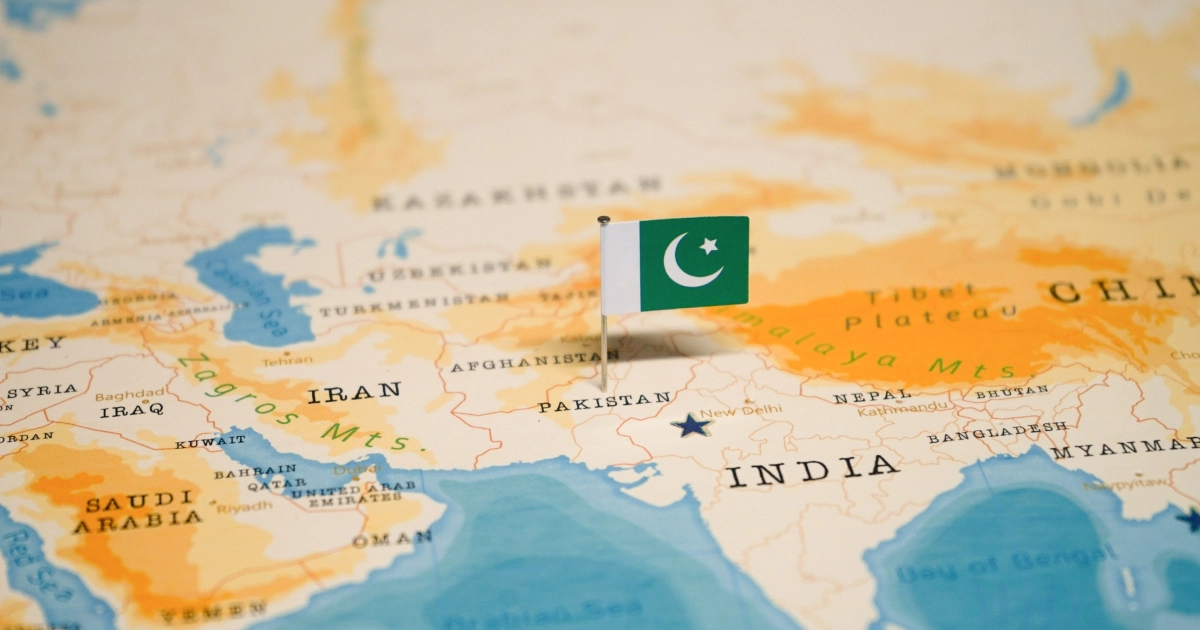How to Tap New Trade Corridors: Connecting Pakistan with the UK and Emerging Markets
Pakistan’s exporters are reducing US reliance by tapping the UK and regional markets. With UK trade hitting £4.7B, DCTS benefits, and SEZ-driven efficiency, sectors from textiles to IT are thriving. Payoneer powers this shift with GBP accounts, instant local withdrawals, and exchange rate control.

Introduction
As global trade undergoes seismic shifts driven by geopolitical tensions, evolving tariffs, and post-pandemic realignments, Pakistan’s exporters are being pushed to adapt. The long-standing reliance on the US market now comes with rising risks, including volatile duties, shipping delays and currency swings.
To remain competitive, Pakistan’s businesses are actively turning towards alternative trade routes, particularly the United Kingdom, as well as emerging intra-regional markets. These corridors not only offer increased stability but also align better with modern supply chain strategies and digital trade trends.
This article examines the significance of bypassing traditional trade routes and how Pakistan can capitalize on emerging corridors to enhance its export resilience.
Why Shift Beyond the United States?
For decades, the United States has been one of Pakistan’s top trading partners and primary export destinations, accounting for imports worth approximately $5.1 billion from Pakistan in 2024, according to the U.S. Trade Representative. However, as global trade becomes more fragmented and protectionist, relying too heavily on a single market has grown increasingly risky.
Emerging Challenges
- Tariff Volatility & Protectionism: The U.S. is implementing fluctuating tariffs on a range of imports, creating uncertainty for exporters. Interim restrictions on Pakistan have forced exporters to deal with compliance burdens and shifting duties.
- Logistic Delays & Shipping Costs: Global shipping disruptions have increased freight costs and extended shipping times, adding to the unpredictability of delivery timelines.
Currency Volatility
The Pakistani Rupee has experienced sharp fluctuations against the US dollar in recent years, squeezing export margins in local currency terms. As a result, exporters paid in USD often face revenue uncertainties, complicating budget forecasts and operational stability.
Shift in Trade Policies
Recent US trade policy depicts a shifting focus towards strategic partners like India, leading to reduced engagement with Pakistan on trade matters. Such a trend introduces geopolitical risk to exporters reliant on the US market.
Pakistani businesses are thereby exploring alternative corridors to protect margins, streamline logistics, and hedge against geopolitical uncertainty, as over-dependence on one market is no longer viable.
UK-Pakistan Trade Corridor: Shifting Gears, Booting Growth
As Pakistani exporters seek to reduce reliance on the US market, the United Kingdom presents a compelling alternative. Factors like a strong diaspora base and favourable trade agreements have placed the UK corridor as a rapidly emerging high-value destination for Pakistan’s goods and services.
Bilateral Trade Growth
The UK-Pakistan trade corridor is showing strong momentum, driven by both demand and policy alignment:
- Trade Volume: Bilateral trade grew to an estimated £4.7 billion in 2024, reflecting a steady upward trajectory.
- Sectors: Key sectors fueling growth include agriculture, textiles, and IT & Digital Services.
- Role of Diaspora: The Pakistani community in the UK acts as a cultural and economic bridge, facilitating trust and continuity in trade, especially for FMCG, textiles, and digital products.
According to a 2021 UK census, there are approximately 1.6 million British Pakistanis, roughly making up about 2.5-2.8% of England and Wales’ population.
Benefits of UK DCTS
Pakistan qualifies under the UK’s Developing Countries Trading Scheme (DCTS), offering several advantages to exporters, including:
Preferential Market Access
- Reduced or zero tariffs on key Pakistani exports.
- Especially beneficial for textiles, leather, sports goods, and agro-products.
Simplified Compliance: DCTS features relaxed origin documentation requirements, making compliance easier than the previous GSP framework.
Sustainability Boost: Eco-friendly exporters can access enhanced preferences under the ‘green rules’ segment of DCTS, aligning well with Pakistani firms that focus on sustainable sourcing.
Growth in Sustainable Textile Exports
Pakistan’s textile industry has witnessed significant growth in exports to the UK, led by competitive pricing and quality standards. The UK’s favourable trade policies and demand for sustainable textiles present an opportunity for Pakistani manufacturers to expand their footprint.
From Local Roots to Global Reach: Leveraging Domestic Trade Corridors
While global corridors offer scale, domestic integration through Special Economic Zones (SEZs) and regional hubs is empowering SMEs to tap into more efficient logistics and local demand. This section examines how trade within Pakistan and nearby neighbours lays the groundwork for resilient export structures.
Economic Corridors & SEZ
Pakistan has heavily invested in SEZs, such as Gwadar, Rashakai, and Allama Iqbal Industrial City, focusing on trade infrastructure and ease of doing business. These zones offer:
- On-site customs clearance, cutting export delays
- Shared resources like steam, logistics support,and power
- Proximity to transport corridors, enabling trade with Central Asia and China
SME Growth Through Regional Integration
Pakistan’s expanding broadband and logistics networks enable SMEs to manage orders and inventory in real time, crucial for efficient distribution and export readiness. The emergence of regional and third-party warehouse providers offers rural manufacturers crucial access to storage and fulfilment capabilities close to production hubs.
Tech-enabled hubs in Islamabad and Lahore are becoming export-ready, while SMEs in Faisalabad and Multan benefit from localized logistics.
Sectoral Spotlight: Sectors Benefiting the Most
Certain industries are pulling ahead, showcasing the real-world impact of strategic corridors. Here’s how key export sectors are gaining momentum.
Textiles: Value-added apparel exports to the UK have increased as brands embracing ethical production now benefit from DCTS and UK retail partnerships.
IT Services: UK firms are increasingly outsourcing development, testing, and customer support. Pakistani tech teams offer 40–60% cost savings without compromising service quality.
Furniture Exports: Demand for semi-custom furniture from Pakistan is rising in the UK, with SME exporters gaining traction through e-commerce platforms like Etsy UK and Wayfair.
Agriculture & Food Products: Pakistani rice, spices, dried fruit, and frozen snacks now feature widely in UK supermarkets and online outlets, underpinned by diaspora trust and clean-label positioning.
Case Studies Highlighting Pakistani Exporters in Action
Behind the hard numbers are real companies making strategic moves to win in the UK markets. These case studies offer practical insights and inspiration.
Fashion Retail Expansion: Khaadi and Sapphire Retail Limited
Pakistani fashion brands are making significant inroads into the UK market.
Khaadi
- Established in 1998 and expanded internationally
- Runs three physical boutiques in major UK cities, including London, Birmingham, and Manchester.
- The brand’s emphasis on traditional textiles and contemporary designs resonated with the South Asian diaspora and broader UK market.
Sapphire Retail
- Established in 2014, and opened its first UK store in Bradford in October 2024.
- It launched a UK-specific e-commerce site with express delivery options.
- The brand’s focus on quality fabrics and modern designs has contributed to its international success.
Gourmet Foods Taps Ethnic Aisles in the UK Food Market
Gourmet Foods, a prominent Pakistani food manufacturer, has expanded its operations to the UK, catering to the demand for authentic South Asian cuisine.
It specializes in frozen snacks, with products now found in major UK ethnic food aisles and online ethnic grocery platforms. The company has tapped into the South Asian diaspora’s trust in Pakistani flavors and Halal-certified products.
These case studies show how Pakistani businesses of various scales are adapting and thriving through new trade corridors.
Enabling Cross-Border Trade: How Does Payoneer Fit the Puzzle?
As Pakistani exporters chart new routes to the UK and regional markets, efficient, flexible and compliant payment systems become essential. Getting paid swiftly and in the right currency can make or break your cash flow. This is where Payoneer becomes an indispensable partner in enabling smoother and faster global transactions.
Local Accounts for Global Payments
Payoneer makes it easier for Pakistani exporters to access international markets, especially the UK, by offering multi-currency receiving accounts.
- Supported currencies include USD, EUR, GBP, AUD, CAD, and JPY, among others.
- These accounts act like local bank accounts in each supported country.
- This feature enables exporters to receive payments from international clients as if operating domestically in their markets.
For businesses under the UK’s DCTS, this simplifies collection and transfer delays or associated fees.
Direct Bank Integrations for Local Withdrawals
Payoneer has partnered with top banks in Pakistan to streamline fund withdrawals:
Meezan Bank Integration
- Allows linking Payoneer accounts directly through the mobile banking app, Meezan Mobile App.
- Instant withdrawals to local accounts.
- Automatic ePRC certificate issuance with each transaction, aiding in compliance and export incentives.
Habib Bank Limited (HBL) Integration
- Secure and immediate local transfers through HBL’s mobile banking app.
- Ideal for exporters looking for quick liquidity for inventory or vendor payments.
Control Exchange Rates, Maximize Earnings
Payoneer offers the ‘Target Exchange Rate’ feature, which helps exporters manage currency volatility.
- Through this feature, Pakistani exporters can set their preferred exchange rate for GBP or any supported currency.
- The system auto-executes the withdrawal only when the market hits the set-in target rate.
- This protest margin stabilises earnings and enables better forecasting during currency swings.
From Strategy to Scale: Making Trade Corridors Work
Amid the evolving global trade scenario, Pakistan’s shift away from the US towards high-potential corridors like the UK and regional neighbours is not just strategic, it’s essential. With support from policy frameworks like the UK’s DCTS, rising diaspora demand, and digital enablement through SEZs and tech hubs, Pakistani exporters are well-positioned to grow across borders.
For those ready to embrace this new paradigm, platforms like Payoneer offer a compelling solution. Open your free Payoneer multi-currency account and get paid in GBP, EUR, USD, and other currencies – fast, direct, and without customs barriers.
Disclaimer
The information in this article/on this page is intended for marketing and informational purposes only and does not constitute legal, financial, tax, or professional advice in any context. Payoneer and Payoneer Workforce Management are not liable for the accuracy, completeness or reliability of the information provided herein. Any opinions expressed are those of the individual author and may not reflect the views of Payoneer or Payoneer Workforce Management. All representations and warranties regarding the information presented are disclaimed. The information in this article/on this page reflects the details available at the time of publication. For the most up-to-date information, please consult a Payoneer and/or Payoneer Workforce Management representative or account executive.
Availability of cards and other products is subject to customer’s eligibility. Not all products are available in all jurisdictions in the same manner. Nothing herein should be understood as solicitation outside the jurisdiction where Payoneer Inc. or its affiliates is licensed to engage in payment services, unless permitted by applicable laws. Depending on or your eligibility, you may be offered the Corporate Purchasing Mastercard, issued by First Century Bank, N.A., under a license by Mastercard® and provided to you by Payoneer Inc., or the Payoneer Business Premium Debit Mastercard®, issued and provided from Ireland by Payoneer Europe Limited under a license by Mastercard®.
Skuad Pte Limited (a Payoneer group company) and its affiliates & subsidiaries provide EoR, AoR, and contractor management services.
Related resources
Latest articles
-
Using an Employer of Record in Morocco
Looking for an Employer of Record in Morocco? See how Payoneer Workforce Management’s EOR services help simplify engaging talent in Morocco.
-
Using an Employer of Record in Jordan
Need an Employer of Record in Jordan? Here’s what you need to know about using an EOR in Jordan and how Payoneer Workforce Management can help you engage talent in Jordan.
-
Multi-currency Account: How It Helps Businesses Work With Customers Around the World
Optimize international payments for your IT, eCommerce, or SaaS business with a multicurrency account and easily receive funds from clients from abroad.
-
How to Open an Electronic Wallet: A Guide for Entrepreneurs and Businesses
How quickly and easily can you create an invoice with Payoneer? Learn how it helps businesses accept international payments, track them, and save time.
-
Wire Transfer in Ukraine: What Businesses Need to Know
Wire transfer in Ukraine for business, complete guide: how to make a transfer and receive an international Wire transfer on the account, terms and fees, tips, and examples.
-
Swift, ACH, or Wire: Which International Payment Method Should Businesses Choose?
SWIFT, ACH, or Wire for Ukrainian business: how they work, how they differ, which is cheaper and faster.
Disclaimer
The information in this article/on this page is intended for marketing and informational purposes only and does not constitute legal, financial, tax, or professional advice in any context. Payoneer and Payoneer Workforce Management are not liable for the accuracy, completeness or reliability of the information provided herein. Any opinions expressed are those of the individual author and may not reflect the views of Payoneer or Payoneer Workforce Management. All representations and warranties regarding the information presented are disclaimed. The information in this article/on this page reflects the details available at the time of publication. For the most up-to-date information, please consult a Payoneer and/or Payoneer Workforce Management representative or account executive.
Availability of cards and other products is subject to customer’s eligibility. Not all products are available in all jurisdictions in the same manner. Nothing herein should be understood as solicitation outside the jurisdiction where Payoneer Inc. or its affiliates is licensed to engage in payment services, unless permitted by applicable laws. Depending on or your eligibility, you may be offered the Corporate Purchasing Mastercard, issued by First Century Bank, N.A., under a license by Mastercard® and provided to you by Payoneer Inc., or the Payoneer Business Premium Debit Mastercard®, issued and provided from Ireland by Payoneer Europe Limited under a license by Mastercard®.
Skuad Pte Limited (a Payoneer group company) and its affiliates & subsidiaries provide EoR, AoR, and contractor management services.







